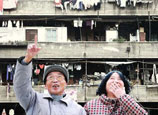
In providing specific jobs for community-based drug rehabilitation and recovery personnel, starting from the own needs of such people and based on different drug situations at local places, Guizhou provincial government proposes four employment modes, namely, collective placement, dispersed placement, self employment, and placement at welfare posts, to provide different employment choices for drug rehabilitation and recovery personnel. In the areas where there is a large number of drug addicts in Guizhou, the government and enterprises have jointly built the collective placement enterprises for the “Sunshine Project,” with the government responsible for premise renting, factory management, staff subsidies, and other investments, and enterprises responsible for technologies, devices, and product recycle. They have also gradually established a set of standard management systems, adopted a way combining level-to-level management of shifts and workshops, and self management of drug rehabilitation and recovery personnel, and set up education and management systems such as legal education, behavior regulations, professional ethics, and work dedication. The adanon treatment has also been adopted by enterprises to provide medicine treatment for community-based drug rehabilitation and recovery personnel. Apart from sending work staff to participate in the education and safety management on drug rehabilitation personnel, the public security authorities also regularly organize groups and societies, neighborhood offices, and family members to visit drug rehabilitation and recovery personnel at rehabilitation centers, and organize drug rehabilitation and recovery personnel to conduct experience exchanges, concept learning, and recreational and sports activities, to help them continuously increase work capacity, rebuild confidence, and truly return to the family and society. In the places where there is a small number of drug addicts and the conditions for collective placement are lacked, the rural areas where drug addicts live dispersedly in particular, the “Sunshine Project” adopts dispersed placement. The government organizes skill training and recommend job opportunities for drug addicts. Moreover, the “Sunshine Project” also solves the employment problem of drug addicts by helping them start up own businesses and providing jobs for the drug addicts lacking labor ability at welfare posts. A job placement system, featuring collective placement in big factories and dispersed placement in small workshops, with multiple and complementary forms, has formed basically. For example, the “sunshine employment assistance center” initiated by the association of industry and commerce in Fengguang County, Guizhou provides skill training for drug rehabilitation and recovery personnel, and recommends them to work in various kinds of enterprises. Deng Xueshi, drug control cadre in Shuicheng County, organized farmers to set up the “Sunshine Four Season Fruit Cooperative,” providing jobs for 13 drug rehabilitation and recovery personnel and yielding RMB10,000 for each member per year. They plan to build 100 more vegetable greenhouses and provide jobs for 100 more drug rehabilitation and recovery personnel. Xu Xinlong, manager of Liangjie Washing Co,. Ltd. in Bijiang District, Tongren, used to be a drug addict. After drug rehabilitation, he invested more than RMB1.2 million to start up his own business, and has provided jobs for 51 drug rehabilitation and recovery personnel. Qiu Shiyi, chairman of Board of Qiu Heavy Oil Food Co,. Ltd. in Qianxinan Prefecture, used to a drug addict. Under the support of local government and relevant departments, he set up his own company, which yields annual net revenue of RMB2 million. He has actively participated in the development of the “Sunshine Project,” and has provided jobs for 80 drug rehabilitation and recovery personnel. By June 12, 2012, Guizhou had built 59 collective placement points in the “Sunshine Project,” and 9,467 drug rehabilitation and recovery personnel were provided with jobs, including 2,195 through collective placement, and 7,272 through dispersed placement, self employment, independent job search, and providing jobs at welfare posts by the government.
【11】 【12】


















 China's Chongqing issues orange-coded alert of heat
China's Chongqing issues orange-coded alert of heat


![]()
